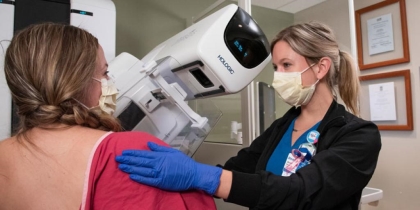
Deanna Cunningham, a diagnostic mammographer at the Tennessee Valley Healthcare System in Nashville helps a patient prepare for the procedure last year. Now, the VA is offering the procedure to younger veterans who had toxic exposures during service. Photo from the VA’s Tennessee Valley Healthcare System.
WASHINGTON — Veterans younger than age 40 might be eligible for breast cancer risk assessments and mammograms if they were exposed to burn pits and other toxins during their service, according to the VA.
Eligibility for the screenings isn’t determined by age, symptoms or family history. Veterans who take advantage of the new program don’t even have to be enrolled in VA healthcare.
In most cases, VA follows American Cancer Society guidelines for breast cancer screenings, beginning screenings and mammograms at age 40. “This potentially life-saving expansion advances President Joe Biden’s Unity Agenda and drives progress toward the goals of the Biden Cancer Moonshot. Promoted by President Joe Biden and first lady Jill Biden, the Cancer Moonshot is mobilizing efforts toward achieving two goals: preventing more than 4 million cancer deaths by 2047 and improving the experience of people who are touched by cancer.
VA also is expanding eligibility for breast cancer risk assessments and clinically appropriate mammograms as part of the implementation of the Dr. Kate Hendricks Thomas SERVICE Act, which became law this past summer.
Thomas was a Marine Corps veteran who deployed to Iraq in 2005 and was exposed to burn pits. In 2018, she was diagnosed with stage 4 breast cancer and died April 5, 2022, at the age of 42. It was sponsored by Sen. John Boozman, R-AR.
Thomas provided written testimony to the Senate Veterans Affairs Committee before the bill passed, stating, “I could have used that information much earlier than I acquired it. We should be telling military women these things and arranging the standard of care for preventive medicine around these increased odds ratios. Put simply, I needed that mammogram sooner.”
“VA Secretary Denis McDonough said the new initiative is “an important step toward making sure that breast cancer is diagnosed early, treated early and—hopefully— sent into remission early.”
The new services are available to veterans who served in the following places and timeframes:
- Iraq between Aug. 2, 1990, and Feb. 28, 1991, and from March 19, 2003, until VA determines burn pits are no longer used in Iraq.
- The Southwest Asia theater of operations, including Kuwait, Saudi Arabia, Oman and Qatar (but not including Iraq), from Aug. 2, 1990, until VA determines burn pits are no longer used in such locations.
- Afghanistan, Djibouti, Syria, Jordan, Egypt, Lebanon and Yemen from Sept. 11, 2001, until VA determines burn pits are no longer used in such locations.
- Other locations and time periods as determined by the Airborne Hazards and Open Burn Pit Registry.
Veterans seeking the screening will undergo a risk assessment, which includes a series of questions about a patient’s toxic exposure(s), family medical history and other risk factors to determine whether they should have a mammogram.
Breast cancer also is a presumptive condition under the PACT Act, which provides screening and benefits to veterans exposed to toxic materials during their military service. Veterans are urged to contact their VA primary care provider or their local VAMC for information on how to receive the services.


